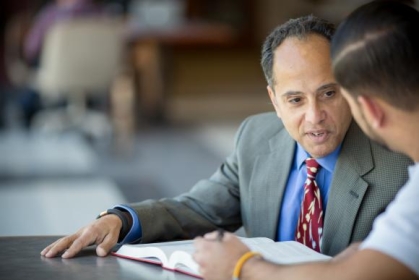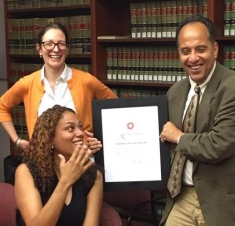Distinguished Service Professor Reflects on Two Decades of Clinical Leadership

Paul Robeson Scholar, and Director, Economic Justice & Public Benefits Clinic
Over his nearly 25 years of service to Rutgers Law School, Associate Dean for Clinical Education Jon C. Dubin has amassed an impressive number of elite titles. He is a Rutgers University Board of Governors Distinguished Service Professor of Law, Paul Robeson Scholar, and Director of the Economic Justice & Public Benefits Clinic. For the 20 years, he served as Associate Dean for Clinical Education and Director of Clinical Programs.
Dubin returned to the faculty and clinic in 2022 after a one-year sabbatical. He recently reflected on years gone by, his hopes for the future, his extensive history with Rutgers Law, high points in his career, and what’s next.
What made you first decide to come to Rutgers in 1999?
I was teaching and directing the clinical program at St. Mary’s School of Law in San Antonio, Texas, and was looking to move back to the northeast mostly for personal circumstances, all coalescing in 1998: a newborn son; the death of my mother-in-law in San Antonio, who lived alone and had needed assistance; and the illness of my parents in New York City, who were seeking connection with a new grandchild.
Among the schools with openings I considered, I was most interested in Rutgers–Newark because of its mission and history as an institution committed to true diversity and inclusion, social justice, public engagement and a long-established clinical program.
I had been the first tenured Black faculty member at St. Mary’s and the founder of its first in-house clinic; I knew that neither would be the case at Rutgers–Newark. And as a public interest attorney in New York City in the 1980s, I was well aware of its “People’s Electric Law School” reputation as the school of Arthur Kinoy, Ruth Bader Ginsburg [RBG], and several public interest lawyers I knew and really admired such as my senior ACLU colleague, Rutgers–Newark alumnus and former Minority Student Program (MSP) Dean Wade Henderson. I also had a few friends and colleagues here: Professor David Troutt interned with me as a law student when I was a junior attorney at the NAACP Legal Defense and Education Fund (LDF); MSP Dean Jan Robinson and I worked together at the Legal Aid Society; and I co-drafted a circuit brief in a police killing case with Professor Chuck Jones through the NCBL’s Racially Motivated Violence Committee. I had also worked on a class action in Newark while at LDF and liked the city, and still had friends and colleagues in the Newark public interest legal community from that work.
Why did you agree to serve as Clinic Director and Associate Dean for Clinical Education in 2002?
Truth be told, I was quite reluctant to take on the position and it took me three years to commit. I was a “recovering clinical director,” having just served in that role for five years at St. Mary’s. I also knew that since Rutgers–Newark never had a clinical director before, a template for all office systems and many aspects of program operations would have to be developed from scratch, producing many changes in a 30-year-old program and some in the school as a whole—including issues involving the role and status of our non-tenure track clinical colleagues. I had a very enjoyable and exciting period during my first three years at Rutgers–Newark without the administrative duties of clinic deaning—co-counseling a social security disability case in the U.S. Supreme Court; immersing clinic students in work on a major Newark public housing/land use discrimination class action; drafting law review articles on the imperative of racial diversity/inclusion in clinical programs, and a (predicted) blueprint for clinical education in the new millennium (with Margaret Barry and Peter Joy); and doing national work in chairing the AALS [Association of American Law Schools] Poverty Law Section and serving on the Clinical Law Review Editorial Board, CLEA [Clinic Legal Education Association] Board, and AALS Clinical Section EC, all in that period.
But I was also strongly encouraged to take on the clinic leadership position by some of the senior clinical faculty right away, such as Nadine Taub, Frank Askin, and Jon Hyman, and then especially by Dean Stuart Deutsch. They impressed on me the importance of unifying and consolidating the separate and balkanized clinics into a coordinated program and law office, and the need for new ideas and (then) young (in their view), nationally engaged leadership for the program’s evolution and development. After three years, I agreed that someone really needed to do this, and I decided to give it a try.
What changes did you see in the clinical program or in the law school generally during your time as Associate Dean/Director of Clinics?
The clinical program did evolve from eight or nine fully separate clinical enterprises into a unified clinical program. Our transactional clinic director and clinic Deputy Director Bob Holmes drafted bylaws for decisionmaking and governance among all to secure collective buy-in, and we started to regularly meet for the first time and coordinate many aspects of operations such as common curricular and evaluation principles/protocols, enrollment management, student outreach and information, law office operations, ethical office systems, mechanisms for shared program and office space, and resources and allocation of staff. Much collaborative teaching, lawyering, and scholarship grew out of our new structure.
We also largely resolved issues of clinical faculty status, job security, and governance in phases, ultimately arriving at a unified tenure track. As a result, several clinical faculty became substantially more engaged in the life of the school and university as a whole. Some developed influential and groundbreaking programs and centers extending well beyond the Newark clinics, such as Laura Cohen’s Center on Criminal Justice, Youth Rights and Race with the School of Arts and Sciences-Newark; Jenny Valverde’s Health Education Advocacy and Law (HEAL) Collaborative with the Rutgers Medical, Public Health and Social Work schools; and Randi Mandelbaum’s Juvenile Immigrant Representation Project with Joanne Gottesman on the Camden campus and the NJ Department of Children and Families.
We also hired a terrific cadre of new, tenure track clinicians such as Anju Gupta, Alexis Karteron, and Norrinda Hayat, who become national leaders in the clinical community and helped energize our program in newer directions and in response to the emerging social justice challenges of these times.

In addition to all you have achieved at Rutgers, you have made a mark nationally. You have authored numerous books, you’re known as an expert on social security law and policy, your articles have been cited by multiple federal courts of appeals and the U.S. Supreme Court, and you have won several state and national awards. What are some of your proudest accomplishments?
I’m really proud of many of the relatively less visible aspects of this work as a teacher and administrator. I still get chills watching students, including those who had struggled at some point, grow exponentially in their role representing clients and community groups in great need. It’s thrilling to witness those moments when students take responsibility and reflect a sense of identity in the role, while applying and improvising on the lessons and concepts we’ve been teaching. I’m not simply talking about obvious high profile events like powerful student oral arguments in formal federal court appeals or effective and deft cross examinations of expert witnesses at administrative hearings—although those are great!—but also rising to the challenges of less glamorous but essential lawyering functions such as sensitive and thorough counseling sessions with communicatively challenged clients on complex legal and functional issues, and informal yet prolonged negotiations with public benefit administrative agency personnel on issues of crucial economic survival for our clients.